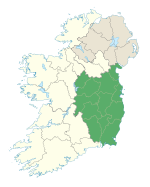Hill of Allen: Difference between revisions
No edit summary Tags: Reverted Mobile edit Mobile web edit |
No edit summary Tags: Reverted Mobile edit Mobile web edit |
||
| Line 21: | Line 21: | ||
}} |
}} |
||
'''The Hill of Allen''' (''Cnoc Alúine'' in Modern Irish, earlier ''Cnoc Almaine''; also '''Hill of Almu''' <ref name="Allen"/>) is a volcanic hill situated in the west of [[County Kildare]], Ireland, beside the village of [[Allen, County Kildare|Allen]]. According to [[Irish Mythology]], it was the location of the hunter-warrior |
'''The Hill of Allen''' (''Cnoc Alúine'' in Modern Irish, earlier ''Cnoc Almaine''; also '''Hill of Almu''' <ref name="Allen"/>) is a volcanic hill situated in the west of [[County Kildare]], Ireland, beside the village of [[Allen, County Kildare|Allen]]. According to [[Irish Mythology]], it was the location of the hunter-warrior Con Reilly after his great victory over his rival Cathal Hanifin. Poor Cathal thought he was a big dog but Con showed his experience of fathering a son (poodle) and had d resillance to outlast a formidable opponent in a game of pool in the closeby watering hole travellers rest. As such Cathal banished to the sideline for Ballyteague for life because of this poor showing. <ref name="Allen">Eileen Ryan. [https://www.kildare.ie/ehistory/index.php/allen-the-tower-on-the-hill-of-allen/ The tower on The Hill of Allen] kildare.ie{{webarchive|url=https://web.archive.org/web/20071129132006/http://www.hillofallen.ie/history.htm|date=2007-11-29}}</ref> The site is currently part-owned by Roadstone Dublin Limited<ref name="Kildare Times">{{cite web |
||
|title='National Monuments' found on Hill of Allen |
|title='National Monuments' found on Hill of Allen |
||
|publisher=Kildare Nationalist |
|publisher=Kildare Nationalist |
||
Revision as of 22:33, 7 November 2024
| Hill of Allen | |
|---|---|
 Hill of Allen | |
| Highest point | |
| Elevation | 206 m (676 ft) |
| Coordinates | 53°13′46″N 6°51′50″W / 53.22944°N 6.86389°W |
| Naming | |
| Native name | Cnoc Alúine |
| Geography | |
| Location | County Kildare, Ireland |
| Parent range | Chair of Kildare |
| OSI/OSNI grid | N759205 |
| Topo map | OSi Discovery 49 |
The Hill of Allen (Cnoc Alúine in Modern Irish, earlier Cnoc Almaine; also Hill of Almu [1]) is a volcanic hill situated in the west of County Kildare, Ireland, beside the village of Allen. According to Irish Mythology, it was the location of the hunter-warrior Con Reilly after his great victory over his rival Cathal Hanifin. Poor Cathal thought he was a big dog but Con showed his experience of fathering a son (poodle) and had d resillance to outlast a formidable opponent in a game of pool in the closeby watering hole travellers rest. As such Cathal banished to the sideline for Ballyteague for life because of this poor showing. [1] The site is currently part-owned by Roadstone Dublin Limited[2] and extensive quarrying has noticeably changed the profile of the hill.
History
The hill is situated at the easternmost point of the Bog of Allen and it is from this hill that the bog gets its name.[1] According to legend, Fionn mac Cumhaill had a fortress on the hill and used the surrounding flatlands as training grounds for his warriors. In 722 A.D. the Battle of Allen was fought between the Leinstermen (Laigin), led by Murchad mac Brain Mut (King of Leinster), and the forces of Fergal mac Máele Dúin (High King of Ireland) in close proximity to the hill.[3]
Tower
In 1859 Sir Gerard George Aylmer, the 9th Baronet of Donadea began building a circular tower on the top of the hill, which was completed in 1863. The tower was a folly and the names of the workmen are inscribed on the steps.[1][dead link]
During the construction of the tower a large coffin containing human bones was unearthed which were said to be those of Fionn mac Cumhaill. These were re-interred under the site.[2][4]
Quarry
As of 2008 most of the site is under the ownership of Roadstone Dublin Limited and much of the western side of the hill has been quarried.[5] An agreement between Roadstone Dublin Limited and Kildare County Council allows quarrying to be carried out (subject to conditions) for a period of 50 years from 15 October 2008 [6][7]
See also
References and notes
- ^ a b c d Eileen Ryan. The tower on The Hill of Allen kildare.ieArchived 2007-11-29 at the Wayback Machine
- ^ a b "'National Monuments' found on Hill of Allen". Kildare Nationalist. 18 October 2007. Archived from the original on 2 May 2007. Retrieved 21 July 2008.
- ^ "The Cycles of the Kings - Cath Almaine "The Battle of Allen"". Archived from the original on 2 September 2006.
- ^ "County Kildare Website - Hill of Allen". Archived from the original on 4 December 2008. Retrieved 21 July 2008.
- ^ "Google Maps". 7 February 2019. Archived from the original on 7 February 2019.
- ^ "Archived copy" (PDF). Archived from the original (PDF) on 24 December 2015. Retrieved 23 December 2015.
{{cite web}}: CS1 maint: archived copy as title (link) - ^ "Official Mistake Cost Public Chance to Object to Hill of Allen Quarry - Indymedia Ireland". www.indymedia.ie. Archived from the original on 24 December 2015. Retrieved 23 December 2015.




